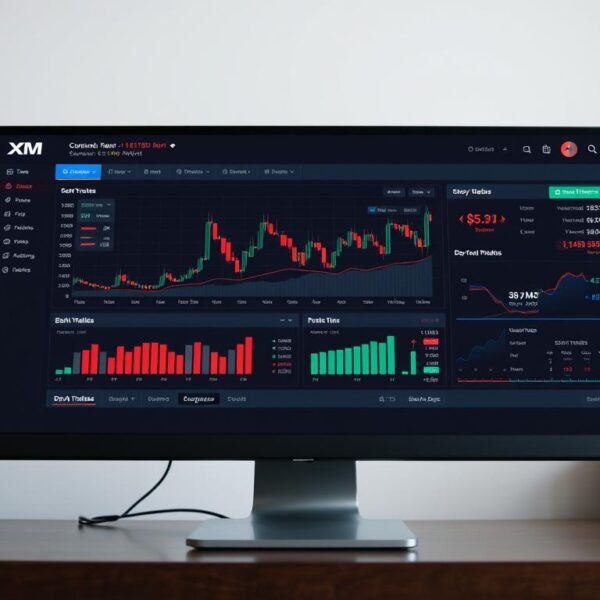Broadcom leads the AI chip market, controlling 70% to 95% of it. This makes it one of the top AI chip makers. Tech giants like OpenAI need to team up to stay ahead in AI.
OpenAI wants to raise $7 billion for a new AI chip. They’re hiring former Google AI team members for this project. This shows how crucial good semiconductors are in AI.
OpenAI is talking to industry and government to get the tools it needs. Team up with Broadcom, and they could change AI forever.
Key Takeaways
- Broadcom dominates the AI chip market, controlling 70% to 95% of the global share.
- OpenAI’s ambitious plans to develop a custom AI chip have faced challenges, leading the company to explore strategic partnerships.
- The collaboration between OpenAI and Broadcom aims to strengthen the former’s supply chain and reduce its reliance on industry leaders like Nvidia.
- This partnership highlights the growing importance of robust semiconductor capabilities in the AI industry as companies race to harness the power of artificial intelligence.
- The strategic alliance between OpenAI and Broadcom is poised to reshape the competitive landscape in the AI chip manufacturing sector.
Understanding the Strategic Alliance Between OpenAI and Broadcom
The world of artificial intelligence (AI) is changing fast. Tech giants are working on special hardware for AI. OpenAI, a top AI research company, has teamed up with Broadcom, a big name in semiconductors. They’re making a custom AI chip together.
This partnership aims to solve problems with current chips. Chips like CPUs and GPUs struggle with AI tasks. Broadcom’s know-how in semiconductors and ASICs will help make a faster, more efficient AI chip.
Initial Discussions and Partnership Goals
OpenAI and Broadcom have been talking for a while. They want to change the AI hardware world. A team of 20 designers, including former Google engineers, is working on these chips. They hope to start making them by 2026, moving away from Nvidia’s GPUs.
Market Impact and Industry Response
This partnership could change the AI chip market. Right now, Nvidia leads with 70% to 95% market share. OpenAI and Broadcom’s move could shake things up. It could lead to new ideas in data center chips, cloud computing accelerators, and machine learning hardware.
Key Stakeholders in the Collaboration
More than just OpenAI and Broadcom are involved. Microsoft, Apple, and Nvidia are watching closely. The success of this partnership could impact the whole AI world. Being able to make special AI hardware could be key for companies to stay ahead in AI.
The Current State of AI Chip Manufacturing
The demand for advanced neural network processors and edge AI chipsets is growing fast. Nvidia leads the market, holding between 70% to 95% share. But, newcomers like Broadcom, Microsoft, and Apple are changing the game. They focus on custom AI chips and accelerators for IoT devices.
Recent data shows a competitive market. Broadcom’s shares fell by 6.7% as of 3:28 p.m. ET. Taiwan Semiconductor Manufacturing and Arm Holdings also saw declines. This shows the high stakes and quick changes in AI chip manufacturing.
Despite economic worries, AI’s potential is huge. Alphabet, Google’s parent, nearly doubled its AI data center spending. Elon Musk worries about Nvidia GPU supply issues. These signs highlight the industry’s challenges.
| Company | Market Share | Growth Projections |
|---|---|---|
| Nvidia | 70% – 95% | Nvidia executed a successful 10-for-1 stock split in June 2024 |
| Broadcom | Emerging Player | Broadcom aims to target $10 billion in AI revenue for FY 2024, up from $4.2 billion in FY 2023, and increase total revenue by 40% year-over-year to $50 billion |
| Intel | Challenger | Intel’s Gaudi AI chip is twice as power-efficient and runs AI models 1.5 times faster than Nvidia’s H100 GPU |
The data center AI chip market is expected to hit $200 billion by 2030. This makes the competition fierce. Broadcom is challenging Nvidia with its focus on efficient, high-performance AI hardware.
The rivalry between giants shows AI’s huge potential. Advanced chip technology is key to the future of computing and innovation.
Broadcom AI Partnership: Breaking Nvidia’s Market Dominance
The partnership between Broadcom and OpenAI could change the AI chip world. Nvidia has led the market for years, but Broadcom is now a strong rival. They have the skills to make custom AI chips.
Market Share Analysis
Broadcom has worked with Google on AI chips before. This experience helps them compete in the AI chip market. They are now seen as a top player in AI stocks.
Competitive Landscape in AI Chip Production
Nvidia is still the top, but Microsoft and Apple are also in the game. Broadcom teaming up with OpenAI is a smart move. It aims to meet the growing need for AI and 5G tech.
Broadcom is ready to take on Nvidia with its big investments in engineering. They have the money and resources to grow their AI chip business.
“Broadcom is noted to tackle established markets with a focus on sustained engineering investments, building 26 sustainable franchises.”
Broadcom spends over $5 billion a year on research and development. This focus on long-term tech leadership could help them challenge Nvidia’s lead.
Sam Altman’s Vision for Custom AI Chip Development
Sam Altman, OpenAI’s CEO, is leading an effort to create custom AI chips. He wants to lessen OpenAI’s dependence on Nvidia’s GPUs. Altman plans to use the skills of former Google employees who know how to make tensor processing units (TPUs).
His goal is to boost OpenAI’s ability to develop AI. This move aims to make a processor that meets AI’s specific needs. It’s a partnership with Broadcom and TSMC to change OpenAI’s setup and cut costs over time.
This investment in custom chip tech is a big change for OpenAI. By making their own machine learning hardware and neural network processors, OpenAI wants to meet its AI needs better. They aim to set a new benchmark for AI performance and efficiency.
Altman first tried to raise $7 billion for this project. He met with SoftBank Group and G42, but didn’t get all the funds. Yet, the partnership with Broadcom and TSMC shows a long-term plan. The custom edge AI chipsets won’t be ready until 2026, showing a careful and thorough approach.
“The collaboration aims to reduce OpenAI’s reliance on Nvidia and AMD technologies, potentially diminishing Nvidia’s monopoly in AI chip solutions.”
Experts think custom chips could change how AI models are made and used. This could lead to better performance and lower costs. OpenAI’s move could make them leaders in the fast-changing AI hardware world.
Technical Specifications and Innovation Potential
Broadcom and OpenAI are teaming up to create new AI chips. They haven’t shared all the details yet. But experts think these chips will boost AI work, especially for IoT intelligent devices and 5G AI networking.
Custom Chip Architecture Plans
Broadcom and OpenAI are designing a special chip. It will be made to work better and use less power for AI tasks. This chip will likely outperform standard chips, making data center chips more efficient.
Performance Expectations and Benchmarks
Experts predict these new AI chips will be much faster than today’s. They will have more power, better memory, and special AI tools. This will make AI training and use much better for many tasks.
Integration with Existing AI Infrastructure
It’s important for Broadcom’s chips to work well with current systems. They aim to make it easy to use these chips in today’s AI setups. This will help avoid big changes or retraining costs.
| Key Specification | Expected Improvement |
|---|---|
| Processing Power | Up to 2.5x increase over current market leaders |
| Memory Bandwidth | 30% higher than state-of-the-art solutions |
| Power Efficiency | 20% reduction in energy consumption |
“We’re focused on developing the next generation of custom AI silicon that can truly unlock the full potential of large language models and other emerging AI applications.”
– Sam Altman, CEO of OpenAI
Investment and Financial Implications
The partnership between Broadcom and OpenAI is changing the AI chip market. They plan to make a new AI chip processor, starting production in 2026 with TSMC. This move has made Broadcom’s stock value go up, showing the market’s positive reaction.
This partnership could mean big changes for OpenAI and Broadcom. It challenges Nvidia’s lead in AI chips. It opens the door for new AI chip solutions.
The partnership could lead to big financial gains for both companies. Sam Altman wanted to raise $7 billion for a custom AI chip project. The Broadcom and OpenAI partnership might offer a better way to fund and develop these chips, changing the AI chip market.
| Metric | Value |
|---|---|
| Return on Investment (ROI) | 89% |
| Net Present Value (NPV) | $2.54 million |
| Quantified Benefits |
|
| Unquantified Benefits |
|
| Cost Breakdown |
|
| Total Three-Year Benefits | $5.4 million |
| Total Costs Over Three Years | $2.86 million |
| Net Present Value (NPV) of Benefits Minus Costs | $2.54 million |
The Broadcom AI Partnership brings both challenges and opportunities. It involves big investment risks and supply chain issues. But it also offers chances for better efficiency and cost savings through AI.
As the Broadcom AI Partnership grows, its financial impact and investment chances will be closely watched. This partnership could change the AI chip market, opening new paths for innovation and growth.
Impact on Cloud Computing and Data Center Operations
OpenAI and Broadcom’s custom AI chips could change cloud computing and data centers a lot. These chips might need new setups to work right, which could be tough but also open up new chances for those running cloud services and data centers.
Infrastructure Requirements
When Broadcom’s AI chips come out, cloud and data center folks will have to think about their setup again. They might need to:
- Get more power and cooling to handle AI’s high demands.
- Update their networks for fast data moving in machine learning.
- Get better storage for huge AI data sets.
- Use new tools to manage and use AI hardware well.
Scalability Solutions
As more people want cloud computing accelerators and data center chips for machine learning hardware, cloud and data center teams need to find ways to grow. They might:
- Make data centers that can easily add new AI tech.
- Use smart systems to share and use AI hardware well.
- Use new ways to run AI workloads in a flexible way.
- Work with hardware makers to bring in the latest tech fast.
By tackling these issues, cloud and data center teams can make the most of Broadcom’s AI chips. This will help their AI services run better, faster, and more efficiently.
| Metric | Private AI on VMware | Public AI Services |
|---|---|---|
| Cost Savings | 3-5x cost savings | Higher and less predictable costs |
| Resource Utilization | Efficient GPU, network, and compute sharing | Limited resource optimization |
| Operational Efficiency | Centralized tools and processes | Fragmented management and complexity |
| Total Cost of Ownership | Dramatically lower TCO | Higher TCO for AI applications |
The table shows why using cloud computing accelerators and data center chips for machine learning hardware on a private cloud like VMware is better than public AI services.
Future Applications and Industry Applications
The custom AI chips from the Broadcom-OpenAI partnership are set to change many industries. These chips will make AI models like ChatGPT and GPT-4 even better. They will improve machine learning, computer vision, and natural language processing.
These chips will be used in edge computing and IoT devices. They will help make decisions faster and analyze data better. This will change smart manufacturing, self-driving cars, and smart homes.
The partnership also aims to improve 5G networks. These AI chips will make networks work better and handle more data. This is good for the growing need for AI in telecom.
As Broadcom and OpenAI work together, we can expect new uses for these AI chips. They will help in natural language processing and computer vision. This will have a big impact on many industries.
| Industry | Potential Applications |
|---|---|
| Smart Manufacturing | Predictive maintenance, quality control, process optimization |
| Autonomous Vehicles | Real-time object detection, decision-making, and navigation |
| Healthcare | Diagnostic support, drug discovery, personalized treatment |
| Telecommunication | Network optimization, 5G infrastructure, edge computing |
| Intelligent Home Automation | Voice control, energy efficiency, proactive home management |
The work of Broadcom and OpenAI will change the future of neural network processors and edge AI chipsets. It will also impact IoT intelligent devices and many industries in big ways.
“The future of AI is in specialized chips that can power the next generation of intelligent devices and applications. Our partnership with Broadcom aims to make this vision a reality.”
– Sam Altman, CEO of OpenAI
Conclusion
The partnership between OpenAI and Broadcom is a big deal in the AI chip world. It challenges Nvidia’s lead and could change how we develop AI in the future. This Broadcom AI Partnership shows how important custom AI chips are for artificial intelligence collaboration and tech in many fields.
This partnership could lead to more competition, new ideas, and easier access to semiconductor AI solutions. It’s a big step forward.
This team-up between OpenAI, Broadcom, and TSMC shows how fast AI hardware is changing. Big names like Google and Amazon are also working on custom AI chips. They’re racing to make chips that can handle complex AI tasks better.
This push for better chips shows the industry’s need for efficient AI solutions. It’s all about making AI work faster and smarter.
The effort by OpenAI, Broadcom, and TSMC is a sign of a bigger change. Tech companies are working together more. They’re sharing their knowledge and skills to create new AI possibilities.
This teamwork is a sign of a new era in AI. It’s all about combining strengths to achieve more together.







